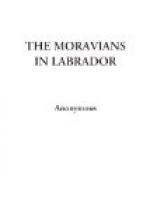in are now in the depths of the sea, my only refuge
is the Saviour; all my thoughts rest on him.”
The widow Esther, however, deserves particular notice;
she was bred at Kilanok north from Okkak, and when
a child came on a visit to Nain in 1773, where she
and her countrymen heard for the first time the missionaries
speak of the Creator and Redeemer of men; this made
a great impression upon her, and though a child, and
surrounded only by the heathen, it constantly occurred
to her mind, “It is he who made all things and
knows all things; he, therefore, knows me and can
help me.” Often she told the missionaries,
that when she was at Kilanok, she would go out to
a mountain and weep and pray to Jesus, particularly
when any thing painful happened to her. After
her father’s death a man took her for his third
wife, which placed her in the most painful circumstances,
as he was a rude wicked wretch, a sorcerer, and a
murderer. In the year 1787 he died, and she was
left with two children completely destitute, for every
one hated them on his account. Her children were
so dreadfully beaten that they both died in consequence;
but though they were thus cruelly treated in her presence
she durst not interfere, as the savages in ridicule
pretended it was the Torngak that bid them, and threatened
her also with death. At last Rebecca, one of
the baptized, had compassion on her in this disconsolate
situation, and brought her to Okkak. Here the
missionaries soon perceived such an earnest desire
after salvation as they say they had never before
seen in any Esquimaux, though she at first spoke but
little. In 1789, she was baptized, and soon after
was a partaker of the holy supper. She lived
in constant communion with her Saviour, for she had
learned to know him as her comforter, her counsellor
and help, and often said, “He is indeed my Father;
wherever I go, and wherever I am, he is with me, and
I can tell him every thing.” Esther was
the first converted person among the Esquimaux who
continued faithful unto the end, without allowing herself
in any thing sinful, and though often asked in marriage
by unbelievers, so far was she from listening to such
proposals, that her reply was, “I would not
disturb my present enjoyment even to marry a believer.”
For had she married, she must have gone in summer
with the other Esquimaux to the distant places where
they procured their furs and skins, while in her present
state she could always remain at the settlement, and
enjoy the privileges of a Christian church. She
learned to read and write, so that she wrote letters
with her own hand to the sisters at Nain. In
June 1792, when she was taken ill, she sweetly repeated,
“Whether I live I am the Saviour’s, whether
I die I am the Saviour’s—living or
dying I am the Saviour’s! Yes! he hath bought
me with his blood, and he will take me to himself!”
She died after three days illness, aged thirty years.




